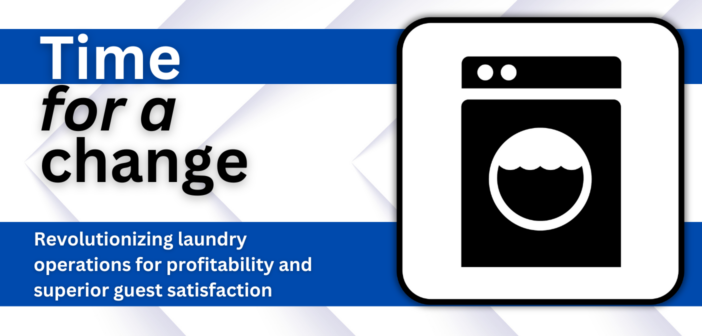Revolutionizing laundry operations for profitability and superior guest satisfaction
Laundry management is one of the most important services you find in a hotel. Ensuring bed linen and towels are clean, crisp, qualitative, and available are key to guest satisfaction and critical to a hotel’s good reputation.
Global hospitality figures from STR show that hotel occupancy rates in 2022 were above 65%, and average revenue per room is increasing as the industry recovers from the pandemic. However, if hotels run low on freshly laundered linen and are unable to make up the rooms, they cannot accept new guests. As rooms represent 65% of a hotel’s revenue, efficient laundry management is vital to profitability.
As the industry becomes more and more competitive, here are five significant challenges hotels face when managing linen flows and ensuring they have enough inventories:
- Inaccuracy in linen assortment planning and allocation
- Increase in linen purchases and associated linen-management costs
- Decrease in housekeeping service quality
- Loss of room sales
- Decline in customer satisfaction
On average, hotels lose approximately 20-30% of linen – at a cost of upwards $50,000 – a year, due to general wear and tear, thefts (attractive linen is always tempting for staff and guests to take as a memento), and poor control systems when sending/receiving linen to/from laundry plants.
MAKE IT COUNT
Linen management is a time-consuming and labor-intensive task requiring repeated manual counting, often leading to errors. Housekeeping must follow regular inventories of linen, which means physically counting the stock of linen in the operation cycle and in all locations – linen rooms, laundry, floor pantries, room-attendant carts, guestrooms. This entire procedure must be completed in a day and as often as possible, as linen is continuously in use.
Implementing an efficient laundry-management system can address these challenges and yield several benefits. Bearing in mind that from farm to factory to store, a cotton T-shirt requires 3,000 liters of water and very high energy to grow, produce, and transport (according to figures from YarnsandFibers News Bureau), by minimizing linen waste, extending the life of linen, and purchasing the right number of linen items, hotels can reduce their environmental impact.
Embracing RFID technology and cloud-based software solutions has led to a significant digital transformation in laundry and linen inventory management.
An advanced linen tracking system offers game-changing solutions, enabling hotels to achieve cost savings, streamlined inventory management, enhanced guest satisfaction, increased productivity, and a more sustainable operation.
DETAIL ORIENTED
As a broad overview, each linen item is embedded with a small and discreet RFID tag. The tag looks like a care label but contains a unique identifier that gets scanned at each step of the laundry cycle to generate a wealth of valuable data for the housekeeper and the commercial laundry. This is an elegant and invisible solution that simplifies the linen management process and doesn’t disrupt the experience of the customer.
Furthermore, it greatly improves work efficiency. RFID technology offers a tremendous time-saving advantage, enabling fast and contactless reading, making linen counting and inventory management more efficient and accurate. Rather than an employee having to hand-count linen items one by one, several hundred linen tags can be scanned in a few seconds, in laundry carts, or directly on the shelves.
The tracking capability of this tiny device offers textile services professionals the ability to not only track the linen as it moves through the laundry cycle – ensuring it gets returned to linen shelves in a timely manner – but also track the number of washes to evaluate the linen quality. Analysis of tag data allows hotels to know when a linen asset falls below quality standards (i.e, the beyond-50-wash-cycle mark), allowing for an automated selective inventory re-stocking.
The tag data managed by cloud-based software enables linen professionals to know the exact location, condition, and availability of their textile inventory at all times, whether onsite or not.
This technology represents a game-changing solution for the hospitality industry’s linen-management woes. By mitigating inaccuracies in planning, reducing linen purchases and associated costs, improving housekeeping services, preventing lost room sales, and enhancing customer satisfaction, RFID empowers businesses to achieve unprecedented operational efficiency and profitability.





